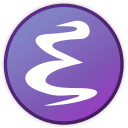Recommendations
Here one can find some help on getting started with some editors or useful configurations or packages to use.
If you have a nice addition please submit it (create an issue).
Thanks. 
Micro
a modern and intuitive terminal-based text editor. Keyboard shortcuts
Install: Download
| Bash | |
|---|---|
1 2 3 4 5 6 7 | |
Vim

Vim (a contraction of Vi IMproved) is a clone, with additions, of Bill Joy's vi text editor program for Unix.
This is a very basic editor, in terms of user interface. Functionality is huge. Make yourself comfortable with the keyboard shortcuts otherwise you will be stuck. This editor or its relative vi is present on any unix system (or linux).
Install: e.g Ubuntu (Debian) VIM Alternative: VIM
Some useful VIM modifications in ~/.vimrc :
| Configuration file | |
|---|---|
1 2 3 4 5 6 7 8 9 10 11 12 13 14 | |
on SRVX2 and JET you can use :term inside vim to split the view into a terminal and an editor. Switch between windows with CTRL+w.
Another super useful command is vimdiff [file1] [file2] to compare two files and show differences between these two. Switch between sides with CTRL+w and use the following shortcuts to:
| Text Only | |
|---|---|
1 2 3 4 5 6 7 | |
Emacs

This is another major editor that is available on all unix (linux) machines as well. It has a commandline interface and a gui. It is much easier than VIM, but again has a lot of shortcuts to learn.
Install: Emacs
There are tons of options and customizations in the ~/.emacs file, which is here
There are much more things that can be added to ~/.emacs if you want. Have a look at CategoryDotEmacs.
IDEs
Atom
![]()
Atom is a free and open-source text and source code editor for macOS, Linux, and Microsoft Windows with support for plug-ins written in JavaScript, and embedded Git Control, developed by GitHub. Atom is a desktop application built using web technologies.
Install: Atom
This editor can do everything, as it is open source and solutions on common problems exist on github. However, it is for more advanced users, as sometimes you need to change things and fix small bugs.
VS-Code
![]()
Visual Studio Code is a freeware source-code editor made by Microsoft for Windows, Linux and macOS. Features include support for debugging, syntax highlighting, intelligent code completion, snippets, code refactoring, and embedded Git. Microsoft has released Visual Studio Code's source code on the microsoft/vscode (Code - OSS) repository of GitHub, under the permissive MIT License, while the releases by Microsoft are freeware.
Install: VS-Code (Microsoft) Open-Source: OSS
This is a great editor and has some nice features for Python, however PyCharm is much better for Python. A great feature is remote development. Using VS-code with remote development on SRVX1 or SRVX8 can be done using instructions and using a singularity container.
Pycharm
![]()
PyCharm is an integrated development environment (IDE) used in computer programming, specifically for the Python language. It is developed by the Czech company JetBrains. It provides code analysis, a graphical debugger, an integrated unit tester, integration with version control systems (VCSes), and supports web development with Django as well as data science with Anaconda.
PyCharm is cross-platform, with Windows, macOS and Linux versions. The Community Edition is released under the Apache License, and there is also Professional Edition with extra features – released under a proprietary license.
Install: Pycharm Community
This is perfect for python development. However, remote development is not supported by the community version and running it via VNC works.
Meld

Download: Meld
Meld is a visual diff and merge tool targeted at developers. Meld helps you compare files, directories, and version controlled projects. It provides two- and three-way comparison of both files and directories, and has support for many popular version control systems.
Joplin
![]()
Download: Joplin
Joplin is a free, open source note taking and to-do application, which can handle a large number of notes organised into notebooks. The notes are searchable, can be copied, tagged and modified either from the applications directly or from your own text editor. The notes are in Markdown format.
It can be synced with your u:cloud account using webdav with Joplin as the directory in your u:cloud and this as url https://ucloud.univie.ac.at/remote.php/webdav/Joplin, using your u:account credentials.
